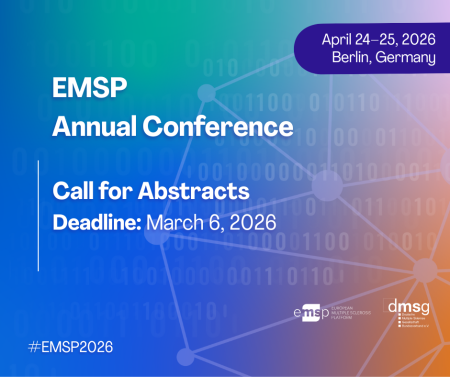
EMSP at ECTRIMS 2024 – Key takeaways
24.10.2024EMSP delegates actively participated in the 40th Congress of the European Committee for Treatment and Research in Multiple Sclerosis ECTRIMS 2024, held in Copenhagen from September 18 to 20, 2024. Our goal was to stay informed about the latest advancements in MS treatment and care while using this international platform to advocate for the needs and rights of people living with Multiple Sclerosis (MS) and highlight the essential role of patients. Through ECTRIMS, EMSP fosters collaboration and networking with MS professionals, working together on initiatives and projects aimed at improving the lives of people with MS. By engaging in ECTRIMS, we also have the opportunity to influence the direction of MS research and clinical practice, especially by bringing forward the patient perspective. With more than 8500 delegates from all over the world attending this edition of ECTRIMS, dive with us into some of the sessions that matter to people with MS!
Nurses’ session on self-advocacy
At ECTRIMS 2024, the MS NursePro program highlighted the essential role of nurses in empowering people with MS to self-advocate and manage their condition effectively. MS nurses are key in understanding the barriers that prevent individuals with MS from advocating for themselves, and they play a pivotal role in co-designing care pathways alongside patients. Proper MS-focused education, open communication, and trust between nurses and patients are foundational to this effort. Additionally, knowing one’s rights as a patient, having access to robust support systems, and navigating available resources are all crucial factors in fostering patient empowerment. During the session, Joelle Massouh presented a case study illustrating how nurses can support individuals with MS by working collaboratively to address their most pressing symptoms or challenges, encouraging a patient-centered approach to self-management. Through this partnership, nurses help guide people with MS toward greater autonomy and confidence in managing their condition.
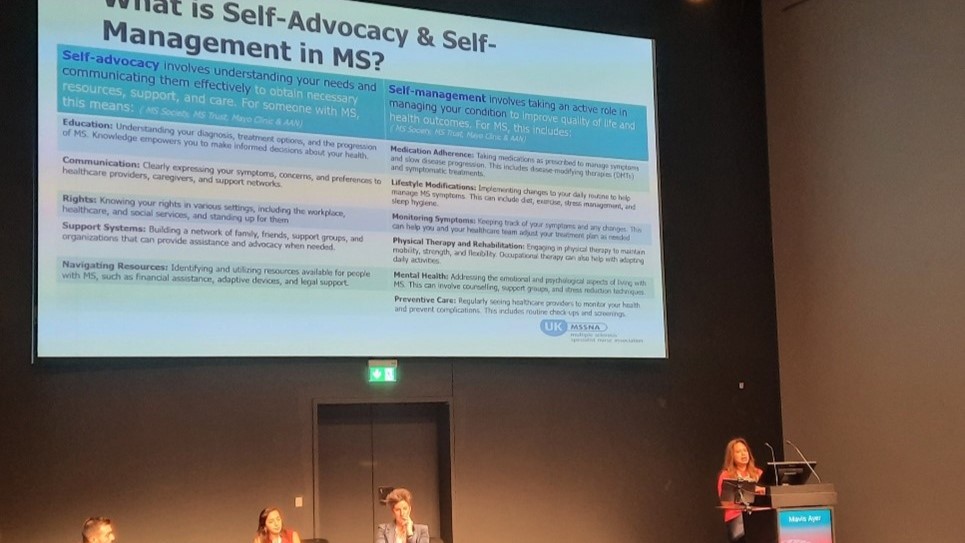
Mavis Ayer discussing self-advocacy and self-management
Hot topic: Infections, risk and prevention
The session on infections and multiple sclerosis (MS) underscored the critical role infections play in the pathogenesis, risk, and management of MS. Professors Marco Salvetti and Fredrik Piehl emphasized that people with MS are at a higher risk of developing infections, which can, in turn, act as triggers for MS relapses. To optimize MS management, infection prevention is paramount, with relevant vaccinations playing a key role, especially as individuals age. However, it’s important to balance the risk of infections with age and other comorbidities. Vaccination planning should be done in consultation with a healthcare provider, particularly as some vaccines may be less effective or contraindicated if the patient is already on certain treatments. Vaccines are considered safe for people with MS, and there is no established link between vaccinations and MS relapses. Special attention was given to Epstein-Barr virus (EBV) during the discussion, raising questions about the potential of an EBV vaccine to prevent or treat MS and whether it could be a preventive or therapeutic intervention. The session highlighted the ongoing debate about convincing people to embrace preventive vaccination, especially given the complex dynamics between MS, infections, and immune response.

Professor Marco Salvetti discussing EBV infection and MS
Use of artificial intelligence in MS
A session exploring the applications of Artificial Intelligence (AI) in MS discussed that the most mature use of AI is in monitoring lesions, with promising developments in predicting relapses, disease progression, and treatment outcomes. Though methods vary, smartphone-based tools are emerging to assess disability classes. The session also introduced the concept of digital twins, where clinical, lab, and patient-reported data can be used to create a virtual replica of the patient, simulating various treatment and prognosis pathways. While this is still under development, it holds potential to enhance personalised care, improve patient outcomes, and optimise healthcare costs. Ethical considerations, data sovereignty, and trust remain key challenges in its advancement.
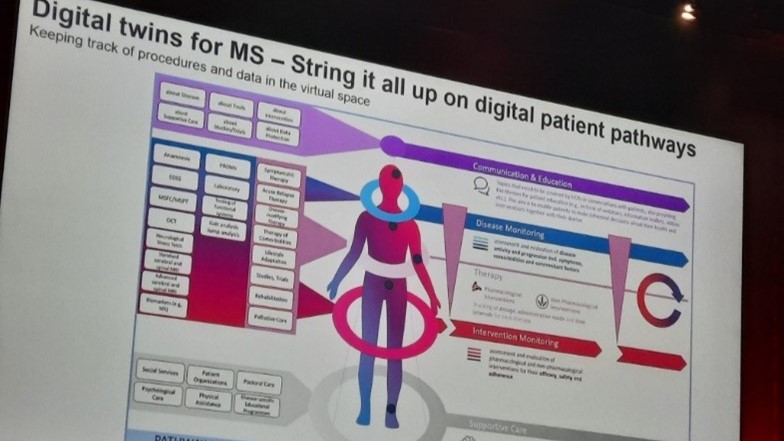
Digital twins is one of the hot, promising topics discussed at ECTRIMS
Ageing in MS
A session focused on ageing with multiple sclerosis (MS), particularly for women, highlighted the significant impact of menopause on MS symptoms. Hormone therapy was suggested as a potential option to manage menopause-related challenges, emphasizing the importance of in-depth conversations between women with MS and their doctors. The discussion also noted that as people with MS age, relapse recovery diminishes, and there is an increased risk of infections and disability. Additionally, evolving support needs were highlighted, with a growing reliance on family, friends, and systemic support to prevent isolation and ensure financial and social stability.
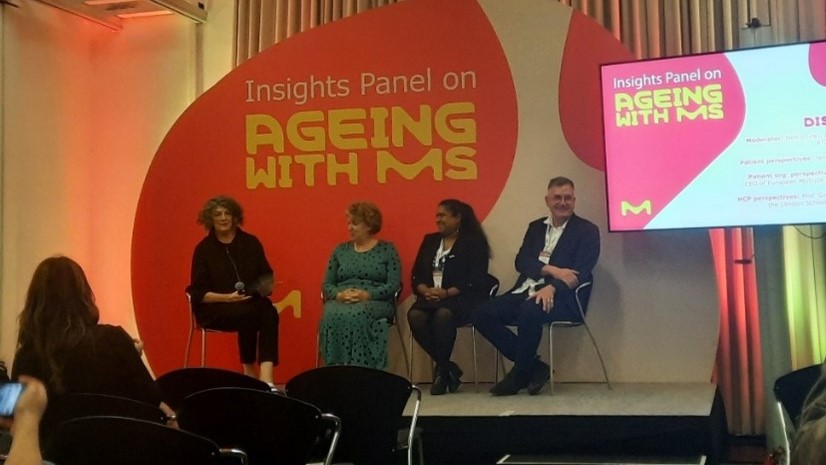
Elisabeth Kasilingam, EMSP CEO, as a panellist discussing ageing in MS.
The Multiple Sclerosis Prodrome
Helen Tremlett highlighted important insights on the MS prodrome, focusing on early indicators and potential biomarkers that precede clinical MS diagnosis. Cognitive impairment, fatigue, anxiety, and depression were noted as common features in the prodrome phase. Studies also revealed a significant increase in healthcare use and psychiatric morbidity before MS onset. These findings underscore the importance of early detection and intervention, offering new opportunities for prevention and better management of disability progression in people with MS.
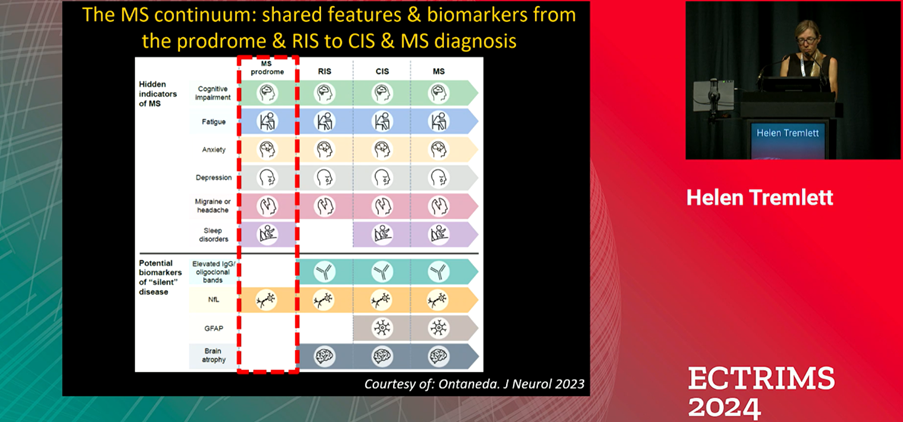
Improving Diagnosis and Treatment for MS, NMOSD, and MOGAD
Recent research is helping to refine how we diagnose and treat diseases that are similar to multiple sclerosis (MS), such as neuromyelitis optica spectrum disorder (NMOSD) and MOG antibody disease (MOGAD). These conditions can be difficult to distinguish from MS, as many patients meet the same diagnostic criteria used for MS, leading to potential misdiagnosis. For example, up to 42% of NMOSD patients and 33% of MOGAD patients show signs typically associated with MS. This can affect treatment options, as the management of these diseases differs.
The findings also highlight that while paediatric onset of MOGAD is common, both conditions present with severe attacks and unique imaging features, which should be considered when determining the best treatment. Additionally, data shows that NMOSD affects populations differently around the world, emphasizing the need for more precise criteria and personalized care to ensure patients get the right diagnosis and treatment early on.
This information is crucial for improving the care of people living with these conditions, helping them receive appropriate and timely treatment to better manage their symptoms.
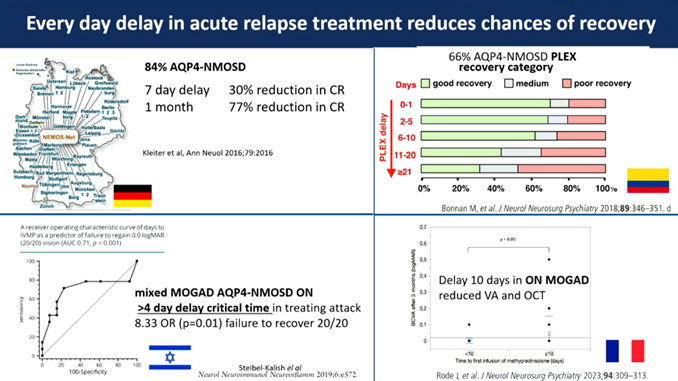
Radiologically Isolated Syndrome
Mikael Cohen presented findings on the nature of Radiologically Isolated Syndrome (RIS) and its relationship to Multiple Sclerosis (MS). The presentation discussed how RIS, often discovered incidentally during MRI scans, could represent a pre-symptomatic stage of MS. From the patient’s perspective, most cases of RIS could be considered as pre-symptomatic MS, yet further research is necessary to clarify the connection between RIS and MS prodromes. The physician’s viewpoint highlighted the importance of accurate assessment tools, as traditional neurological exams might not detect subtle abnormalities. The study also explored the implications for health-related quality of life, which appears to remain stable in RIS patients. Further investigation into the use of digital biomarkers to detect hidden abnormalities was also encouraged.
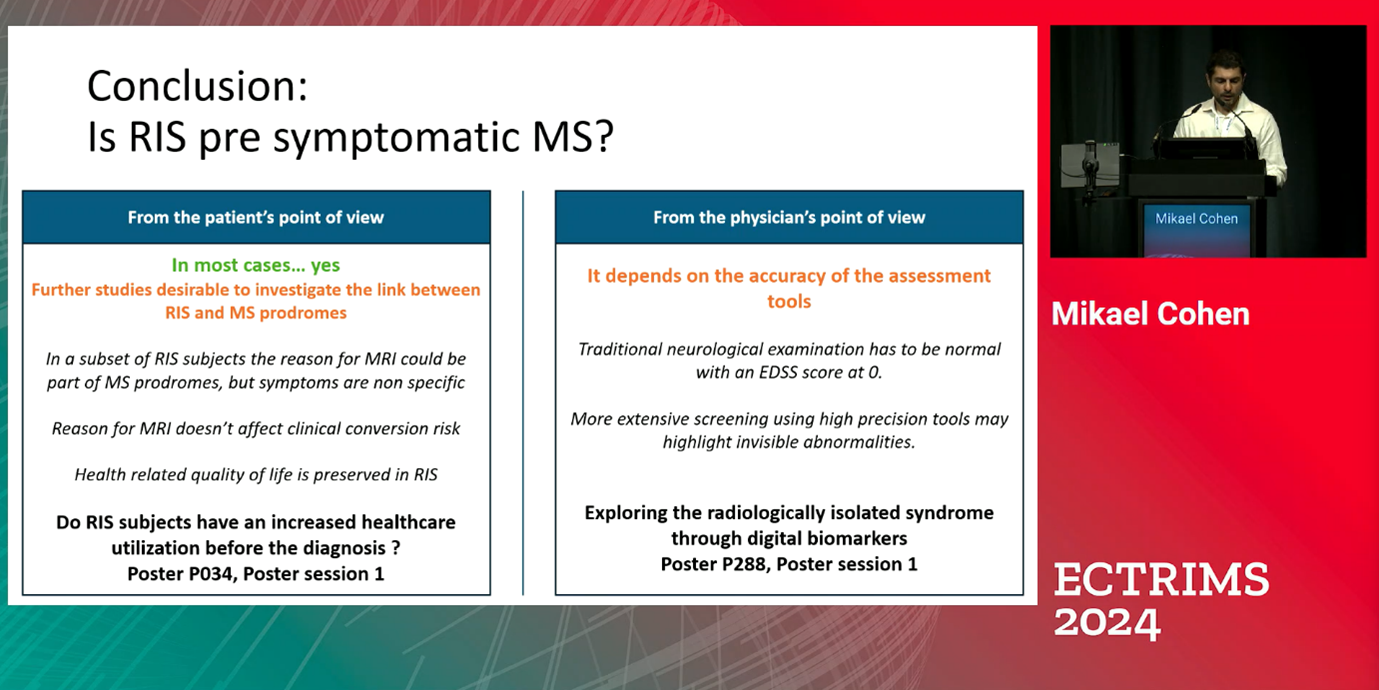
Depression in People Living with MS
Chinese scientists presented at ECTRIMS 2024, shedding light on the multifactorial causes of depression in people with Multiple Sclerosis (pwMS). Researchers discussed new findings that link immune dysfunction, particularly involving TH17 cells, to mental health disorders in MS. Social factors, including reduced social support, financial strain, and the deterioration of relationships, were also identified as significant contributors to depression in MS patients. Additionally, cognitive decline resulting from brain lesions, grey matter atrophy, and reduced brain reserve were shown to further exacerbate depressive symptoms, with around 29% of MS patients reporting emotional difficulties.
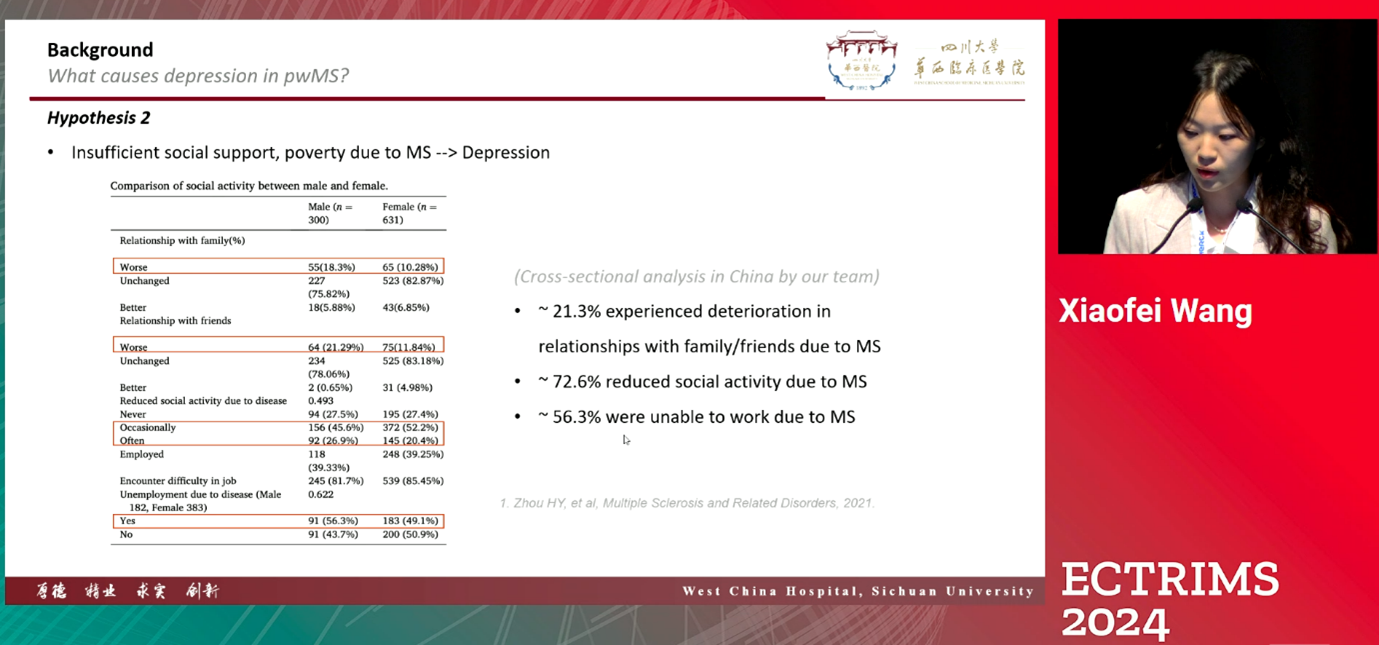
MS Treatment Inequality
The latest findings from the ECTRIMS demonstrate significant challenges and disparities in the access to MS Disease Modifying Therapies (DMTs) worldwide. It is emphasized that despite therapeutic advances improving MS outcomes, access to high-efficacy DMTs is very limited in low- and middle-income countries (LMICs). Furthermore, geographic and racial disparities exist in clinical trials, limiting access to treatment in the pre-marketing phase. Even where DMTs are available, they may not be fully utilized due to costs, lack of prescribers, or awareness. Notably, in 57% of countries, people with MS bear some or all of the costs for DMTs, with many lacking health insurance coverage or facing barriers to reimbursement. This reinforces the need for equitable access to MS treatments globally, underscoring the call for distributive justice in ensuring all individuals with MS have access to life-altering medications.
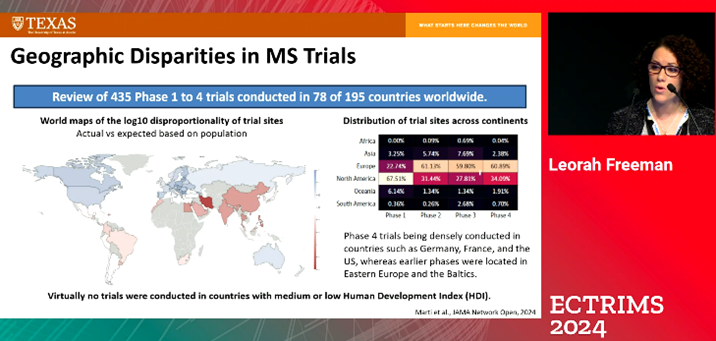
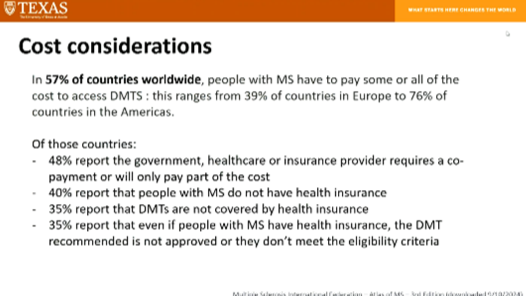
Impact of Multiple Sclerosis Symptoms poster at ECTRIMS
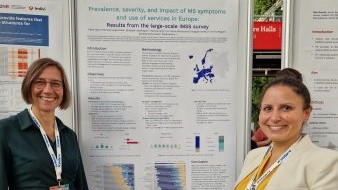
Professor Kos and Moghames at the IMSS poster
Patricia Moghames, EMSP Program Coordinator, alongside Dr. Peter Feys and Dr. Daphne Kos, presented the groundbreaking findings of the Impact of Multiple Sclerosis Symptoms (IMSS) study as a poster at ECTRIMS. This significant project, led by EMSP in collaboration with 24 national MS societies and top experts across Europe, involved over 17,000 participants from 22 countries. The IMSS study sheds new light on the prevalence, severity, and daily impact of MS symptoms, offering valuable insights into how MS is experienced across Europe. Through this research, the team aim to influence the development of personalized care and better policies, ultimately enhancing the quality of life for people living with MS.
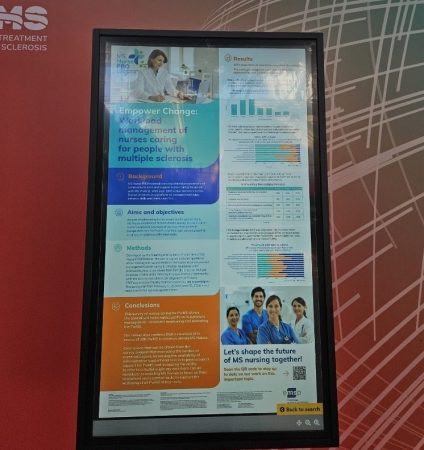
MS Nurse Pro e-poster at ECTRIMS.
MS Nurse PRO’s first advocacy milestone highlighted at ECTRIMS 2024
The MS Nurse PRO program presented its first tangible advocacy result at ECTRIMS 2024: an e-poster showcasing the findings of a survey conducted among MS nurses. The survey reveals the key roles MS nurses play in managing symptoms, monitoring treatment, and educating people with multiple sclerosis. With many nurses managing caseloads of over 300 patients, the findings highlight the need for more nurse colleagues, enhanced administrative support, and better access to psychological and multidisciplinary care services to ensure MS nurses can focus on their specialized roles and improve patient wellbeing
EMSP Booth
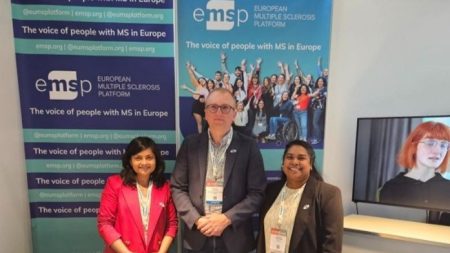
EMSP team, Debianka Mukherjee, Zilvinas Gavenas and Elisabeth Kasilingam at the EMSP booth at ECTRIMS
EMSP also hosted a booth, showcasing its various projects to researchers and the MS community. The booth served as a hub for engaging discussions on EMSP’s ongoing initiatives, aimed at improving the lives of people with MS across Europe. Attendees had the opportunity to learn about key EMSP projects, including research-driven efforts, advocacy campaigns, and educational programs designed to enhance MS care and patient empowerment. By connecting with the global MS research community, EMSP strengthened collaborations and shared its mission to drive change for better MS care, services, and support systems across Europe.
Patient Community Day
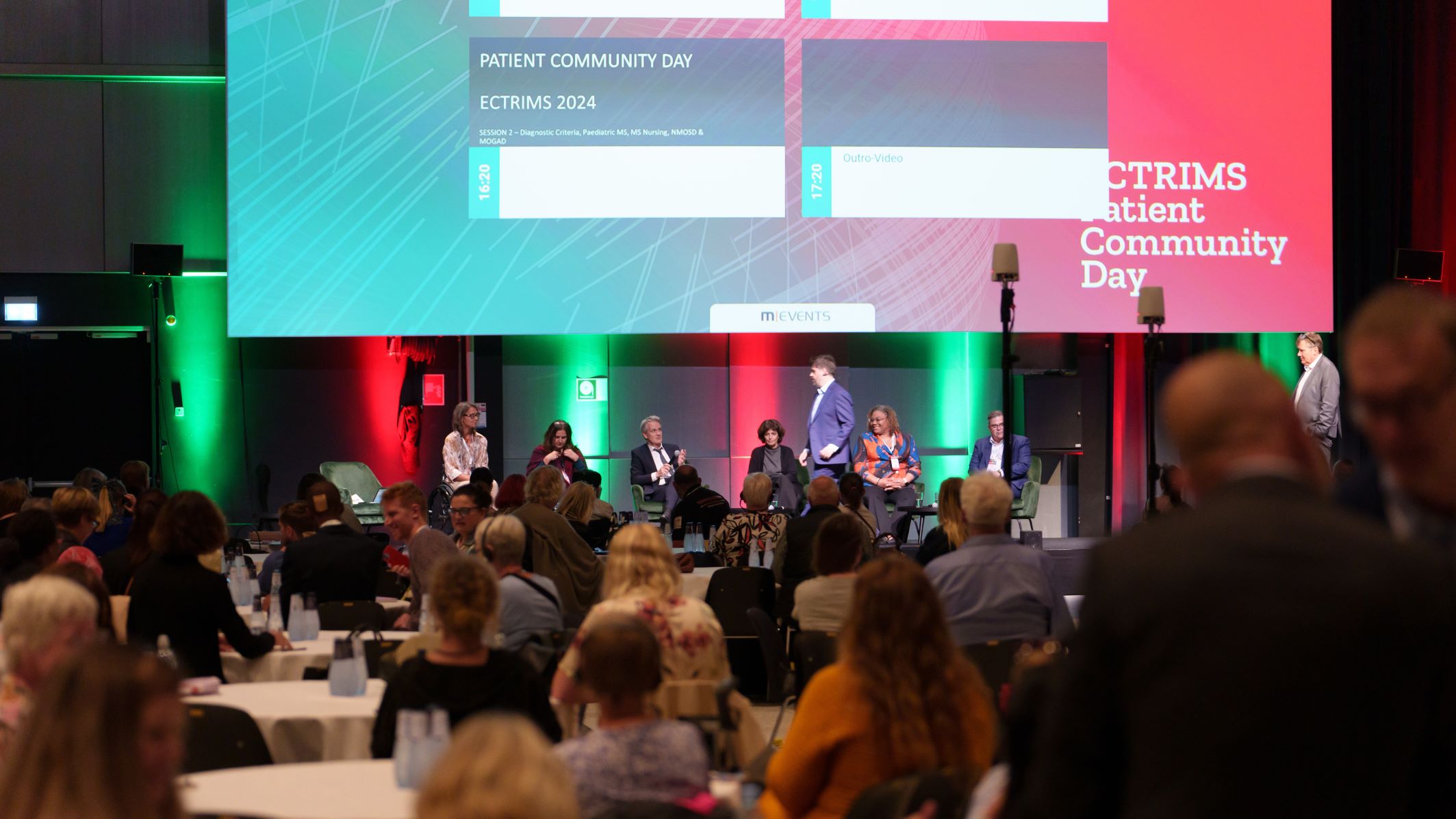
© Bartosch Salmanski – ECTRIMS 2024 Patient Community Day
ECTRIMS also held a day dedicated to people with MS, NMO and MOGAD. The Patient Community Day at ECTRIMS was dedicated to summarising the research findings and hot topics discussed in the 3-day of the conference for the MS community. Its purpose was to engage directly with patients, providing them with insights into the latest research updates. If you missed the ECTRIMS Patient Community Day on 20 September, or you’re looking to revisit some of its impactful moments, you’re in luck! As shared by Maria Blatkowska, ECTRIMS Communications – Marketing and Communication Coordinator: Replays of the event are available, providing a wonderful opportunity to catch up on the discussions and insights shared during this significant day. The ECTRIMS Patient Community Day aimed to bridge the gap between science and patient experience, featuring discussions on vital topics like remyelination, emerging therapies, and the McDonald criteria for MS diagnosis. Experts and patients alike gathered to share their knowledge and experiences, making it a pivotal event for those affected by multiple sclerosis and related conditions.
To view the replays and delve deeper into the sessions that took place, visit the ECTRIMS Patient Community Day website. This is an invaluable resource to understand the latest advancements and discussions in the field of MS research and patient care.
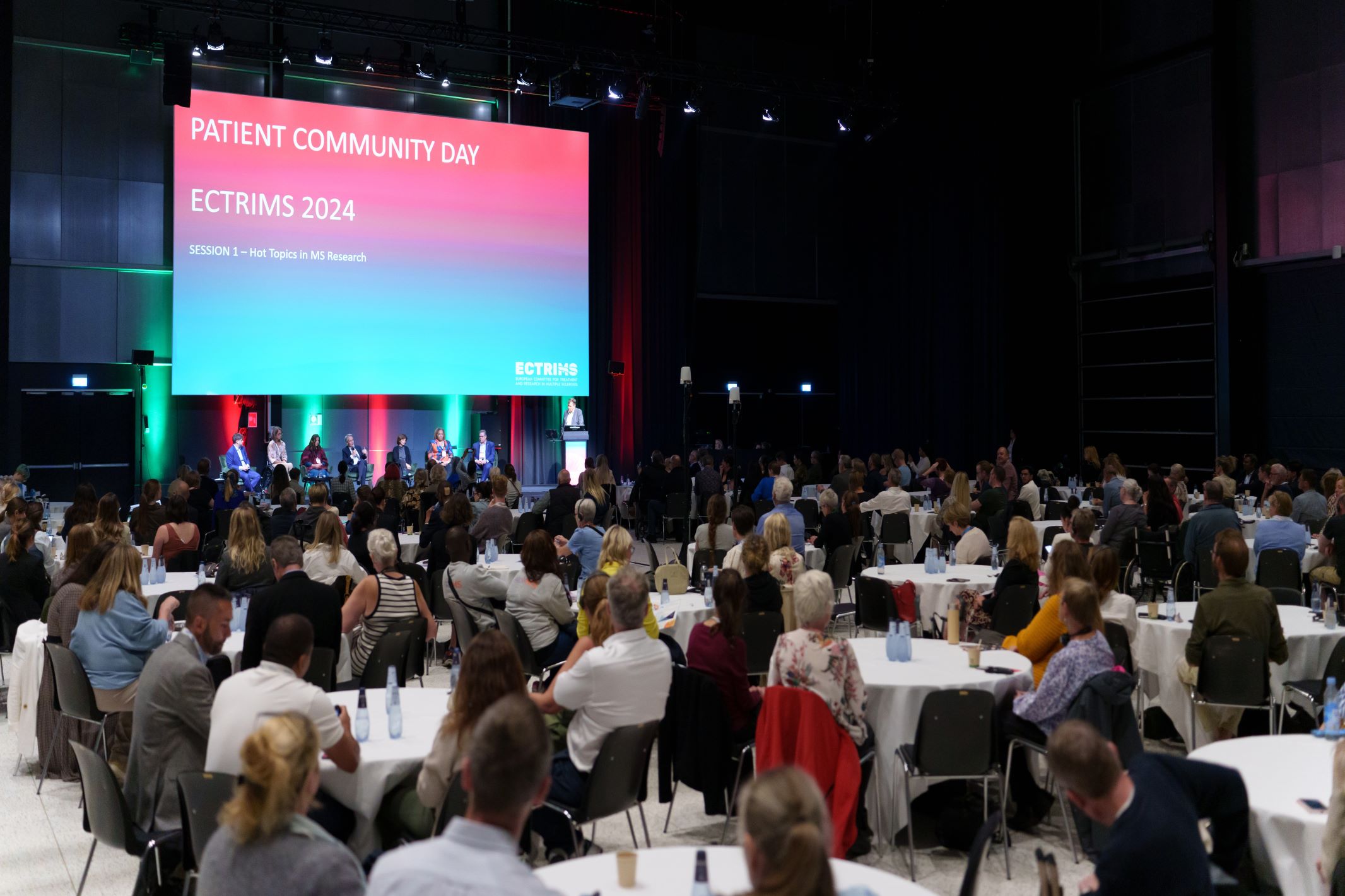
© Bartosch Salmanski – ECTRIMS 2024 Patient Community Day
 Your Account
Your Account